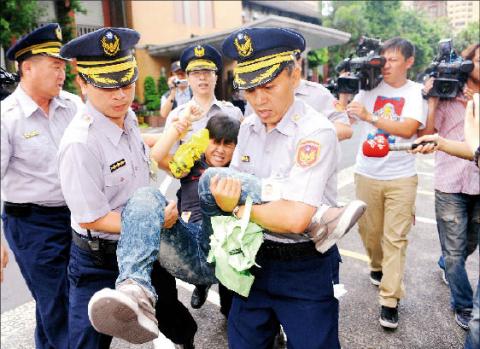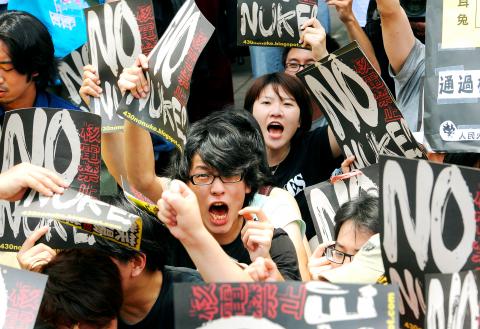The legislature yesterday voted down a set of anti-nuclear motions proposed by the Democratic Progressive Party (DPP).
Holding just one-third of the legislative seats, the DPP failed in 11 attempts to block the use of nuclear power, despite support from anti-nuclear activists who have staged a protest outside the legislature since Sunday night.
A motion to reject the request for a supplementary NT$14 billion (US$485.74 million) in funding from state-owned Taiwan Power Co (Taipower) for continued construction work at the Fourth Nuclear Power Plant in Gongliao (貢寮) District, New Taipei City (新北市), was defeated.

Photo: Chang Chia-ming, Taipei Times
Others motions that failed to pass during the session included one that called for construction of the plant to be suspended and a referendum held on whether the project should continue; another that the plant not be allowed to start trial operations using nuclear fuel before its ability to withstand earthquakes and tsunamis is enhanced, and a third calling on the government to promise not to extend the life of the three operating nuclear power plants.
The DPP also failed in an attempt to remove Daren (達仁), Taitung County, from a list of sites selected for nuclear waste disposal, as it is near active fault lines.
A request that the government re-evaluate the cost of electricity from nuclear power by factoring in the expense of dismantling nuclear power plants and -decontamination of polluted areas was also shot down.

Photo: Chang Chia-ming, Taipei Times
All 33 DPP lawmakers present chanted “Nuclear-free homeland; a sustainable Taiwan,” while one motion after another was voted down.
The Chinese Nationalist Party (KMT) presented counterproposals that demanded the nuclear power plants be subject to thorough safety inspections and new security measures be introduced at the plants. All the KMT proposals passed in the form of resolutions attached to the state-owned enterprises budget for this year.
After the vote, DPP lawmakers accused President Ma Ying-jeou (馬英九) of lacking the determination needed to achieve a nuclear-free homeland, an ideal clearly stipulated in the Environmental Basic Law (環境基本法) promulgated in 2002.
KMT Legislator Hsieh Kuo-liang (謝國樑) said the proposals made by his party would ensure the nuclear power plants met safety requirements, while ensuring the reduction of carbon dioxide emissions and guaranteeing a secure electricity supply.
With the passage of the additional NT$14 billion funding, the total now spent on the construction of the Fourth Nuclear Power Plant, which began in 1997, is NT$264.4 billion.
While the political drama unfolded inside the legislature, anti-nuclear protesters blocked the gates and the street in front of the building.
About 200 protesters had gathered in the morning to protest the government’s plan to continue construction work at the plant.
The protests were organized by Sunflower No Nuke Action, an anti-nuclear alliance made up of more than 40 civic groups, and joined by residents who live near the site of the plant.
Green Citizen Action Alliance secretary-general Tsuei Su-hsin (崔愫欣) said it was undemocratic for legislators to arbitrarily pass the huge budget when many of the details are kept secret from the public, not to mention barring citizens from observing the voting process from inside the legislature.
Green Party Taiwan spokesperson Pan Han-shen (潘翰聲) said that continuing construction at the plant was like throwing good money after bad, adding that the Control Yuan had already -condemned Taipower for more than 1,000 alterations it has made to the original plant design.
Pani (拔耐), an Aboriginal woman and cofounder of Raging Citizens Act Now, provided a clear picture of the implications of nuclear energy for ordinary citizens.
“I come from Taitung County, where nuclear waste is disposed and now live in Keelung, where I am surrounded by three nuclear power plants,” Pani said, adding that it was unfair for Aborigines, who usually consume less energy than other people in Taiwan, to be exposed to the dangers of coal mines in the past, and now nuclear waste.After casting divination moon blocks to determine the will of the Goddess Matsu, goddess of the sea, on Sunday, Gongliao residents brought a statue of Matsu from the main temple in Aodi Village (澳底) to the gates of the legislature.
“We asked if she was willing to come with us to Taipei to protest, and she told us she approved through the divination moon blocks,” Gongliao Anti-nuclear Self-Help Association chairman Wu Wen-chang (吳文樟) said.
“We have about 28 percent surplus electricity now and electricity generated by nuclear power only accounts for about 16 percent [of the nation’s output]. If nuclear power plants were shut down now, we would still have more than enough surplus electricity,” he said.
“So [Taipower], don’t lie to us. We have enough electricity,” he said.
During the nearly four-hour protest in soaring summer temperatures, tension rose when protestors tried to pull open and then climb over the gates to the legislature as they shouted their demands.
Skirmishes and calls of injustice erupted as protesters and police clashed, as those protesters who had been allowed to enter the legislature earlier in the morning to file a petition were escorted out by police officers.
“They kept us waiting in a small room and refused to tell us what was happening inside or allow us to meet legislators,” said Liu Nien-Yun (劉念雲), an organizer at the Taiwan Association for Victims of Occupational Injuries.
“We held up a banner at the doors of the legislative chamber, but were immediately dragged out by police,” Liu said.
When the result of the votes were announced to the crowd at midday, protesters obstructed traffic by lying in the road, claiming their actions simulated what would happen during a nuclear incident.
The groups said that although the budget had passed, their fight against nuclear power would continue.

Seventy percent of middle and elementary schools now conduct English classes entirely in English, the Ministry of Education said, as it encourages schools nationwide to adopt this practice Minister of Education (MOE) Cheng Ying-yao (鄭英耀) is scheduled to present a report on the government’s bilingual education policy to the Legislative Yuan’s Education and Culture Committee today. The report would outline strategies aimed at expanding access to education, reducing regional disparities and improving talent cultivation. Implementation of bilingual education policies has varied across local governments, occasionally drawing public criticism. For example, some schools have required teachers of non-English subjects to pass English proficiency

‘FORM OF PROTEST’: The German Institute Taipei said it was ‘shocked’ to see Nazi symbolism used in connection with political aims as it condemned the incident Sung Chien-liang (宋建樑), who led efforts to recall Democratic Progressive Party (DPP) Legislator Lee Kun-cheng (李坤城), was released on bail of NT$80,000 yesterday amid an outcry over a Nazi armband he wore to questioning the night before. Sung arrived at the New Taipei City District Prosecutors’ Office for questioning in a recall petition forgery case on Tuesday night wearing a red armband bearing a swastika, carrying a copy of Adolf Hitler’s Mein Kampf and giving a Nazi salute. Sung left the building at 1:15am without the armband and apparently covering the book with a coat. This is a serious international scandal and Chinese

TRADE: The premier pledged safeguards on ‘Made in Taiwan’ labeling, anti-dumping measures and stricter export controls to strengthen its position in trade talks Products labeled “made in Taiwan” must be genuinely made in Taiwan, Premier Cho Jung-tai (卓榮泰) said yesterday, vowing to enforce strict safeguards against “origin laundering” and initiate anti-dumping investigations to prevent China dumping its products in Taiwan. Cho made the remarks in a discussion session with representatives from industries in Kaohsiung. In response to the US government’s recent announcement of “reciprocal” tariffs on its trading partners, President William Lai (賴清德) and Cho last week began a series of consultations with industry leaders nationwide to gather feedback and address concerns. Taiwanese and US officials held a videoconference on Friday evening to discuss the

PERSONAL DATA: The implicated KMT members allegedly compiled their petitions by copying names from party lists without the consent of the people concerned Judicial authorities searched six locations yesterday and questioned six people, including one elderly Chinese Nationalist Party (KMT) member and five KMT Youth League associates, about alleged signature forgery and fraud relating to their recall efforts against two Democratic Progressive Party (DPP) legislators. After launching a probe into alleged signature forgery and related fraud in the KMT’s recall effort, prosecutors received a number of complaints, including about one petition that had 1,748 signatures of voters whose family members said they had already passed away, and also voters who said they did not approve the use of their name, Taipei Deputy Chief Prosecutor